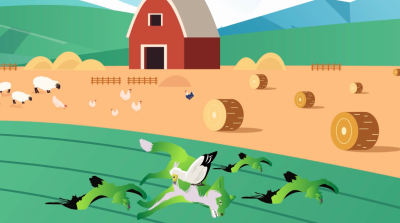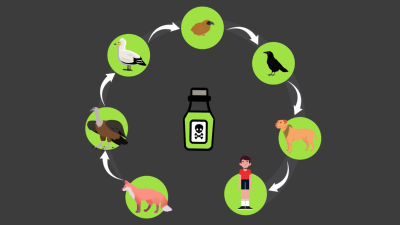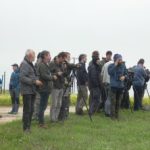Illegal wildlife poisoning is a cruel and harmful practice. Despite being banned in many countries, it remains a widespread method of eliminating animals that are considered pests or predators. The consequences extend far beyond the intended targets, affecting wildlife and even humans. Leaving poison baits out in the open starts a cycle, indiscriminately killing any animal that comes into contact with these toxic substances. This cycle has devastating effects on ecosystems, protected species, and threatens human well-being. Our new video illustrates this cycle of death by poisoning.
The danger of poisonous baits
 In an effort to resolve human-wildlife conflicts, farmers, livestock keepers, and hunters often resort to using poison baits to eliminate animals that can damage crops, livestock, or game species. Poison baits usually consist of pieces of meat or whole carcasses coated with lethal substances such as pesticides (often illegal) such as Carbofuran, banned in the EU. These baits are left in open places that are easily accessible to the animals. However, this practice is indiscriminate, resulting in the slow and painful death of any creature that encounters the bait. This includes not only the intended targets, but also other animals, such as birds of prey, vultures, and even domestic animals, including pets.
In an effort to resolve human-wildlife conflicts, farmers, livestock keepers, and hunters often resort to using poison baits to eliminate animals that can damage crops, livestock, or game species. Poison baits usually consist of pieces of meat or whole carcasses coated with lethal substances such as pesticides (often illegal) such as Carbofuran, banned in the EU. These baits are left in open places that are easily accessible to the animals. However, this practice is indiscriminate, resulting in the slow and painful death of any creature that encounters the bait. This includes not only the intended targets, but also other animals, such as birds of prey, vultures, and even domestic animals, including pets.
Impact on ecosystems and wildlife
The indiscriminate nature of wildlife poisoning has dire consequences for entire ecosystems. The death of even one animal can upset the delicate balance of nature. Vultures that are not normally targeted, feeding on poisoned carcasses, become victims themselves. Such poisoning most often causes the tragic loss of several individuals and even entire colonies. According to the 2022 Balkan Vulture and Poisoning Study, about 115 vultures potentially succumb to poisoning annually in the Balkans. The use of poison is one of the main reasons for the extinction of the Bearded and Black vulture from North Macedonia, as well as the reduced number of the Griffon vulture and the Egyptian vulture. Given that less than 20% of poisoning incidents are detected and documented, the true impact is likely to be even greater. Additionally, the death of predators can result in an overabundance of prey animals, leading to crop damage and other vegetation-related problems. The loss of vultures, which are the main scavengers, could potentially contribute to an increase in livestock and human disease.
Poisoning has no boundaries
Wildlife knows no political borders, meaning that animals that have eaten poisoned bait can meet their end in another country and cause a dangerous domino effect of poisoning. This can lead to the dreaded phenomenon called secondary poisoning, which begins a dangerous cycle of destruction. What is even more worrying is the widespread use of poisons throughout the Balkan countries. These nations share common causes, methods and toxic substances, making the illicit cross-border trade in banned materials significant and alarming.
Impact on people
 The misuse of pesticides has the potential to contaminate our entire food chain. This contamination can go undetected in meat, crops or water, and people who would use it can suffer from severe health problems, ranging from acute poisoning to chronic disease, organ damage, and in the worst case, even death. Poisons used as poison baits wreak havoc on key systems in the body, including the nervous, respiratory and cardiovascular systems. In addition, certain substances can have long-lasting effects, causing neurological disorders, developmental problems or reproductive complications.
The misuse of pesticides has the potential to contaminate our entire food chain. This contamination can go undetected in meat, crops or water, and people who would use it can suffer from severe health problems, ranging from acute poisoning to chronic disease, organ damage, and in the worst case, even death. Poisons used as poison baits wreak havoc on key systems in the body, including the nervous, respiratory and cardiovascular systems. In addition, certain substances can have long-lasting effects, causing neurological disorders, developmental problems or reproductive complications.
Break the cycle
Breaking the cycle of illegal wildlife poisoning requires joint efforts by governments, conservation organizations and local communities. The BalkanDetox LIFE project takes key steps in this endeavor, which include:
- Understanding the problem: Developing a comprehensive database of wildlife mortality across the Balkans, providing accurate data on poisoning incidents to help define the scope of the problem, identify key target groups and hotspots, take direct action in preventive activities and to monitor the effectiveness of anti-poison measures. At the same time, it can facilitate regional and international comparisons, and improve the exchange and coordination of information.
- Awareness raising: Educating relevant stakeholders about the dangers of illegal wildlife poisoning is crucial. By promoting preventive measures and safe alternatives to poison baits, we can effectively deal with wildlife-human conflicts, avoiding the negative consequences of poisoning.
- Building capacities to improve enforcement: The Wildlife Crime Academy played a key role in strengthening the capacities of competent authorities from seven Balkan countries. Through specialized training, these authorities have acquired the skills needed to investigate, manage and combat incidents of illegal wildlife poisoning. It is also necessary to rigorously enforce existing legislation to discourage the use of poison baits. By holding offenders accountable for their actions, we send a strong message that illegal wildlife poisoning is not tolerated.
- Timely response and prevention: Tracking key species such as the Griffon vulture across the Balkans allows us to follow up suspected poisoning incidents in a timely manner. This allows for rapid responses, including de-venoming, ultimately preventing mass mortality in endangered species.
By implementing these strategies and working with all relevant stakeholders, we can break the cycle of illegal wildlife poisoning!


